Brush Cutter vs String Trimmer: What’s the Difference?
-

- Last updated:


Your lawn mower is great…until you come to that pesky part of the yard where it doesn’t quite reach. For those areas, opt for a brush cutter or string trimmer to keep your landscaping looking clean and fresh.
Although brush cutters and string trimmers fall into a related category and even look similar, the two tools vary quite a bit. They each have their own pros and cons and their specific best uses. Before making a purchase, get clear about exactly what you need to achieve and the specs of your ideal tool.

Overview of Brush Cutters
Brush cutters are designed to be able to cut through – you guessed it – brush, meaning thicker weeds or even small saplings or tree stems. The cutting mechanism inside a brush cutter is a metal blade, and there are plenty of exchangeable blades and trimmer heads you can swap out depending on what you’re using the tool for. In addition to its ability to reach narrower patches of overgrowth, the sturdiness of a brush cutter makes it a great choice for cleaning up areas sprouting more than just grass.

How it Works
Brush cutters use a rotating metal blade to chop down vegetation and generally run on gas. Using them can require some practice because the rotation of the blade impacts the direction they should move. Most brush cutters utilize a counterclockwise rotation, so it’s best to move them from right to left when cutting down foliage.
Do not use a chopping motion but rather a smooth and measured movement. Use caution when coming at thicker brush or trees, as the machine can produce some kickback.
Carefully maintain your brush cutter by sharpening or replacing blades when they become worn – which may happen quickly depending on how much sturdy growth you’re cutting or how many rocks you encounter.
When to Choose a Brush Cutter
If you’re looking to tend to an area of brush or small trees, or if you’ve got some sturdy growth to tackle, a brush cutter is likely your best option. Turn to a brush cutter for power and when taking on yard features like saplings.
These are a better option when you need to cut down smaller portions of land, since they can be exhausting to work with for larger areas due to their weight and the strength needed to properly operate them.
Safety
The weight and power behind brush cutters make them a great tool, but they’re also dangerous if not operated properly. Always wear a harness when using a brush cutter to allow you to correctly and safely wield the weight of the machine.
Additionally, do not use a brush cutter without a handlebar. The handlebars allow for more control and help with smooth and safe operation. Plus, if you accidentally hit a rock and the brush cutter is knocked out of your hands, the handlebar acts as a buffer to protect you from the airborne tool.
As with any bladed machinery, it’s best to wear close-toed shoes, long sleeves and pants along with protective eyewear when using a brush cutter.
- Durable
- Powerful
- Reliable
- Can cut through tough thick weeds and trees
- Higher price point
- Can become tiresome to operate
- Safety concerns
- Require maintenance if used for heavy-duty work
Overview of String Trimmers
mers are lighter, easier to use, and less durable than brush cutters. As the name suggests, they use a nylon or monofilament string mechanism to do the cutting, unlike the metal blades inside a brush cutter. Depending on the layout of your yard and the type of foliage you’re up against, a string cutter can be a great addition to your toolshed.
Gas, Electric, or Battery-Powered
String cutters run on gas, electricity, or battery; each type has its own best use. If your yard is full of small, awkward corners and areas your mower won’t reach (or can’t go due to rocks or other landscaping), a battery-powered string trimmer will most likely do the trick.
Some yards just have one small area that poses a problem for other landscaping tools, which may call for an electric corded string trimmer. These are best if you don’t need them to access a long distance and are staying specific to one area that the cord or extension cord can reach.
On the other hand, if you need to use the trimmer to clean up a larger area of your yard and will need it running for quite a while, opt for a gas-powered one. Gas-powered string trimmers also offer more power than electric or battery-powered machines.
When to Choose a String Trimmer
Unless you need to trim down saplings or thicker brush, a string trimmer is a perfect choice for cleaning up any area of your yard. The price point and ease of use make them accessible for anyone to purchase and operate.
Safety
String trimmers can send gravel flying, so vigilance is key if you need to work in a gravelly area. Wear close-toed shoes, protective eyewear and long sleeves and pants when operating this tool.
- Ease of use
- Lightweight
- Lower price point
- Offers full rotation
- Reaches tight spaces
- Will not cut through thick weeds or branchlike plants
- Less powerful
- String can snap if used incorrectly
- Unsafe near gravel
Which is Right for You?
To decide whether to purchase a brush cutter or a string trimmer, consider a few key factors: the features of your yard, your budget, and who will be operating the tool.
Check out your landscaping
Take a look at your yard. If you use a mower, which areas can’t you reach? If you don’t have a mower, how large is the area you’ll need to trim up?
Especially take note of features like rocks and gravel, thick bushes, tough weeds, and saplings you may need to tend to. If you’ll be dealing with anything more than grass, a brush cutter is likely your best bet.
Evaluate your budget
If you’re still on the fence after checking out the yard, consider your price point. The durability and power behind a brush cutter put it at a substantially higher cost, so if price is a main factor for you, you may want to opt for a string trimmer.
Consider your family’s main user
Brush cutters require a considerable amount of strength and precision for proper operation. Think about who will be using your tool most frequently. Is yardwork a chore for a teen in your family? Are you unsure of who may need to step in to clean up your lawn? If you’re not sure that your family’s main user will be able to handle a heavy brush cutter, the safest and least frustrating option is the string trimmer.
Conclusion
Overall, brush cutters and string trimmers are both versatile tools that can make yard work much easier and more efficient. Evaluate factors like landscape features, budget, and main users before making a purchase, and be sure to follow all safety guidelines for operating either of these tools. Enjoy your clean and beautiful yard!
See Also:
Contents



